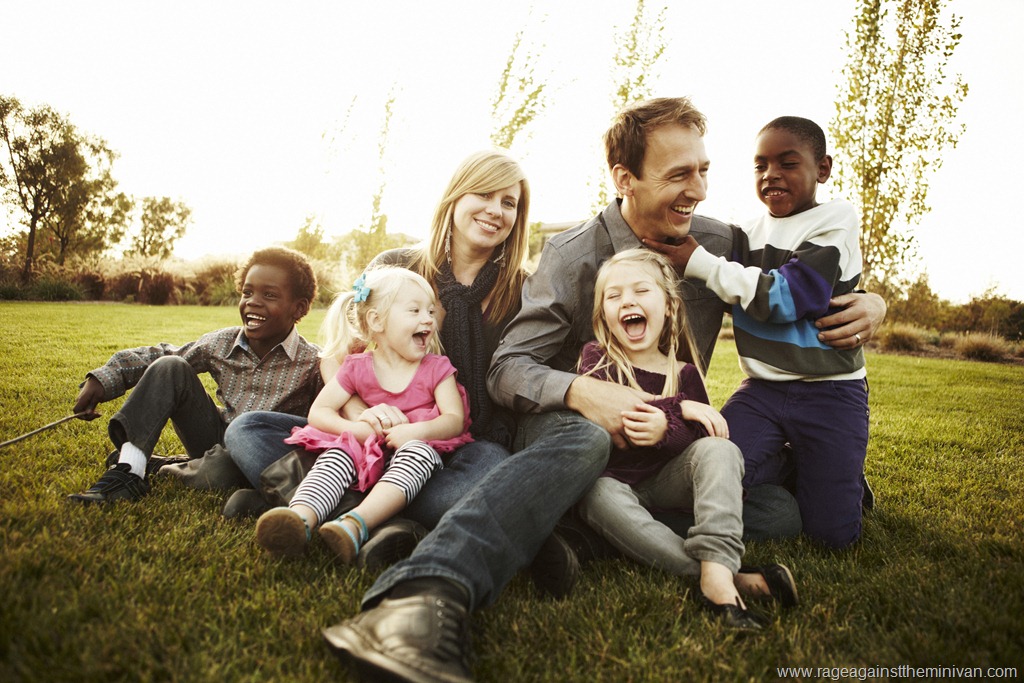
My family has been formed in many ways. My first child was adopted from the foster-care system as an infant. My second two children came the old-fashioned way. My last child was adopted at nearly 4 years old from an orphanage in Haiti. I've been blessed to experience the beauty of childbirth, as well as the joy of meeting an adopted child for the first time. Each experience was equally emotional and life-changing. However, the experience of adopting has given me a unique perspective on motherhood, teaching me some new truths, and reinforcing what I believe to be true about parenting.
Blood does not determine a family.
Probably the most common concern I hear from people who are considering adoption is whether or not they will be able to love a child that isn't "their own". I can tell you, though, that the moment my first son was placed in my arms, he was very much my own. My love for my children is not dependent on our biological connection. Adoptive families, step-parents, and blended families know well that family bonds transcend biology, and that family connections can be formed in many ways.
Those nurturing things we do for our babies in their first year of life? They matter.
I've had the experience of adopting a baby, and also adopting a child who spent his early years in an orphanage setting. While I've always believed that the nurturing, bonding behaviors that we do with babies are important, it becomes even more apparent when you observe how the lack of this nurture effects a child. Research shows that things like touch, eye contact, and attention not only infuse a child with self-worth, but they even effect the way the brain and nervous system develop. When you love an infant, you are impacting their development in profound ways. When a child is deprived of that nurture, the impact can be life-altering.
When you adopt transracially, you do not become the parents of a minority child. You become an interracial family.
Adopting transracially effects the entire family unit, and this means that the whole family must adjust to make sure that a child of another race grows up with a sense of belonging. Adoptive parents must open their eyes to racism, instead of burying their head in the convenient sand of a mythical post-racial world.
Raising a child of another race requires humility and a willingness to seek help.
Race isn't something I think about in our day-to-day routine. By and large, parenting my boys is no different than parenting my girls. I still have the same hopes, dreams, fears, and insecurities as a mom . . . I'm still largely concerned with the day-to-day minutiae that every mom of every race is concerned with. How are they doing in school? How are they doing socially? Are they kind and compassionate? However, this is what I know to be true about raising black boys: it will be imperative for me to teach them that some will look at them with suspicion or stereotype based on their skin color. I HATE THIS. I hate that it's true and I hate that I have to burst their innocence and I hate that it may shift their view of the world. But it's a part of our role as their parents, and we can't do it alone. I don't share that experience, and so I have to enlist other people to help guide them in this. It's why it's so important to us that our boys have strong black role models. This is why I subscribe to blogs like The Root and My Brown Baby and continually attempt to learn.
You can save a child once. After that, it's called parenting.
Adoptive parenting is not a noble pursuit, and I squirm a little any time I hear people perpetuating the narrative that adoptive parents are saviors. While it's certainly true that adoption can save a child from a life of living in an orphanage, adopted children should not be required to bestow special gratitude to their parents. Adoptive parents are regular, imperfect people. Adoptees have the same rights as biological children to be resentful, annoyed, or ungrateful towards their parents, without being reminded that they've been "saved" by their parents.
Personality is determined by DNA. Character is determined by nurture.
When we decided to adopt, we have a few friends with disturbing concerns about how we "didn't know what we were going to get". I would say that this is true for anyone who decides to become a parent. I've observed that all four of my children were born with distinct personalities that seemed to transcend the fact that they've each been raised in the same household. It's been a joy to see how each child's personality develops. All parents would do well to give their kids the freedom to be who they are. However, I do believe that character is shaped by parenting. So while I may not have much influence in regards to how extroverted my kids are, I do believe that I can shape them to be kind, compassionate, and confident individuals.
Every child deserves the love of a family.
Most of us know this intuitively, but as an adoptive parent I've spent time in orphanages and seen the difference that living in a family can make. While it's wonderful that there are settings that can provide an at-risk child with food, clothing, and shelter, I firmly believe that it's in each child's best interest to have a loving parent whose goal is to provide the love and attention that only a family can afford.
